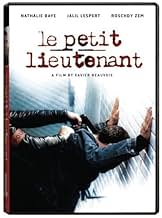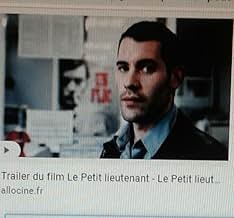Ein Polizeianfänger aus dem provinziellen Le Havre meldet sich freiwillig für das unter Hochdruck stehende Pariser Morddezernat und wird einer Kommissarin mittleren Alters zugeteilt.Ein Polizeianfänger aus dem provinziellen Le Havre meldet sich freiwillig für das unter Hochdruck stehende Pariser Morddezernat und wird einer Kommissarin mittleren Alters zugeteilt.Ein Polizeianfänger aus dem provinziellen Le Havre meldet sich freiwillig für das unter Hochdruck stehende Pariser Morddezernat und wird einer Kommissarin mittleren Alters zugeteilt.
- Auszeichnungen
- 5 Gewinne & 8 Nominierungen insgesamt
- Alex Derouère, le frère d'Antoine
- (as Yanis Lespert)
Empfohlene Bewertungen
Usually I don't like movies about French police for they are mostly very unrealistic.
There however we have a story about what could be a regular case in one of the most important Crime Units in the city of Paris. With regular police work done by regular police detectives.
The actors are playing in a such realistic manner that they just could be real cops caught in their everyday work.
The movie is sad, very sad and hard. I don't think you would apply to become a police officer after seeing it ...
Both are dramas that operate fully within the "crime genre," but whereas there is very little that is original or compelling beyond the dramatic pretense of Eastern Promises, the French film is rich with characterizations and direction that lend depth to its realistic story. Whereas "Eastern..." creates slick, hip Hollywood scenes that tease and gratify our primal senses without really engaging any of its real dilemmas, "Petit..." draws us in (via a casual documentary like style) to the life of a young detective just out of cadet school who is becoming familiar with his co-workers and line of work on the streets of Paris. It is through him and his interactions with everything around him that we begin to experience something more dramatic, almost without realizing it, until the tragedy of common (rather than postured) occurrence invades our psyche, and plays out amidst a suspense created by the tension of anxiety, anguish, and inner strength of his chief inspector (a woman), portrayed with great humanity by Nathalie Baye.
Like all Hollywood movies, Eastern Promises offers the semblance of real drama at the beginning, only to abandon its stories and characters as it lapses into the improbability and titillation we have all grown accustomed to at the cinema. The french film, on the other hand, demonstrates its concern for the people it has given life to by engaging our own humanity rather than our anticipation of the next thrill that lies around the corner....
your cinewest correspondent
For me the rich feel Beauvois brings to his seemingly conventional material begins with the fact that there's no background music it gives events on screen an unadorned quality and with the way Beauvois, who's still in his thirties, puts his own basic experience into the story. Antoine (Jalil Lespert), the "petit lieutenant," the rookie, grew up in Normandy dreaming of being a cop in Paris where the great crimes are solved, he says inspired by watching movies too. Beauvois grew up in Normandy himself, dreaming the same kind of dreams, watching movies, only the dreams were dreams of going to Paris where the great movies are made. Make the simple equation: Crimes+movies=crime movies and you've got a director who's making a parable about his own life.
Caroline Vaudieu (Baye), the Inspector who chooses Antoine for her crime unit, is returning to work on the street again from a long period of the alcoholism that blighted both Beauvois' father's and his own life. Twelve-step recovery and addiction are felt and understood in the film. The AA meetings Caroline attends are in real AA meeting rooms with real alcoholics on screen. Caroline and Antoine are linked in ways that are felt, not contrived. She lost her son to meningitis nine years ago and Antoine's the age her son would be if he'd lived. Antoine's elementary school teacher wife has stayed in Normandy and now he has a room in Paris. He and Caroline share lonely lives; both are making a new start. And the casting is close to home in multiple ways: Beauvois, who also acts in the film as one of the crime team, Morbé, has cast Jalil's actor father Jean and brother Yaniss as his father and brother and his actress wife Bérangère Allaux as his wife.
The opening scenes of Antoine's graduation from police academy and being embraced and congratulated by his family, and the elaborate procedure by which the assignments are handed out to the new graduates, are moments that in other hands might seem routine, but here they fairly bristle with authenticity. Such realism takes time to achieve. Eventually Le Petit lieutenant is going to become exciting, even hair-raising, but it doesn't have the BANG! BANG! opening sequences dear to US directors, nor are those openings about Antoine simply routine: they're the beginning of an extended portrait of Antoine and his new life in Paris. This movie is fundamentally humanistic and it doesn't hurry because we need to get to know Antoine and the team he works with, feel the boredom and routine that are big parts of any cop's life, acquaint ourselves with the details of their personalities.
Somehow I don't think a rookie in an American cop movie would tell his dad that the extraction of a brain in his first witnessed autopsy made him think of Mozart and say "It's strange, I thought: 'Mozart was made of this too.'" There's no "need" for that moment; but it makes all the difference. It's of such moments that good movies are made.
Antoine's on night duty at first and when his team goes out he's made to stay behind to man phones. He gets drunk to celebrate his initiation, which is good for camaraderie (and for the rounding out of Antoine's character) but hard for Inspector Vaudrieu, who must stand by drinking nothing but soda water. As the film, knowing about alcoholism, makes us aware, the alcoholic is only one drink away from relapse, and such times are hard for Caroline. She has to leave the bar and go home early. Later naively the rookie admits to her he used to smoke the occasional joint and surprisingly, she shares one with him. There are inevitable hints from the outside that they might have an affair, but given the feelings, that would be incest. What's clear is that though not much time has passed, they've become close.
The first homicide is a homeless person in the Seine petty stuff. But there are connections with another crime and the investigation turns serious. Eventually a failure of responsibility of one of the men leads to dire consequences. When the action really heats up, it's a shock that hits you in the stomach. The "dull, routine" establishing sequences have lulled you and made you forget that violence might be coming. They've also made you understand and care about the characters in an authentic-feeling way so that when somebody is at risk, you take it quite personally and the whole final section of the movie as its focus shifts more and more to Inspector Vaudrieu is tinged with overwhelming sadness.
Nothing that happens in Le Petit lieutenant is out of the ordinary. What's exceptional is the way the screenplay is written to make you care. There's excitement, tension, violence. But it's brilliantly yet understatedly contextualized. The awareness communicated is that cops' frequently numbing work can also be thrilling, important and heartbreaking. Hollywood sends that message out too, but too often in tired language. Because Beauvois' team clearly cared about their work they've been able to show us cops that do so too.
(NYC March 2006.)
Wusstest du schon
- WissenswertesXavier Beauvois, the director, decided finally not to use background music for this movie. It gives a special atmosphere to the movie.
- PatzerReflected in window as Vaudieu and Solo exit the church.
- Zitate
Mireille, la logeuse: [after Antoine introduces himself as Lieutenant Derouère] These days, it's "Lieutenant" and "Captain." It's too much like the Army. Not that I don't like the Army, but "Monsieur l'Inspecteur"... It makes me think of Maigret...
- VerbindungenReferenced in Mozart der Taschendiebe (2006)
Top-Auswahl
Details
- Erscheinungsdatum
- Herkunftsland
- Offizieller Standort
- Sprachen
- Auch bekannt als
- The Young Lieutenant
- Drehorte
- 118 Rue des Pyrénées, Paris 20, Paris, Frankreich(shelter where Antoine gets stabbed)
- Produktionsfirmen
- Weitere beteiligte Unternehmen bei IMDbPro anzeigen
Box Office
- Bruttoertrag in den USA und Kanada
- 216.724 $
- Eröffnungswochenende in den USA und in Kanada
- 16.871 $
- 10. Sept. 2006
- Weltweiter Bruttoertrag
- 3.984.265 $
- Laufzeit
- 1 Std. 50 Min.(110 min)
- Farbe
- Sound-Mix
- Seitenverhältnis
- 1.85 : 1

![Bande-annonce [OV] ansehen](https://m.media-amazon.com/images/M/MV5BZTQ1NDYxZTYtMGRjZC00YTkwLTkxZTktODMzNjk1NjU0MWExXkEyXkFqcGdeQXRyYW5zY29kZS13b3JrZmxvdw@@._V1_QL75_UX500_CR0)


























